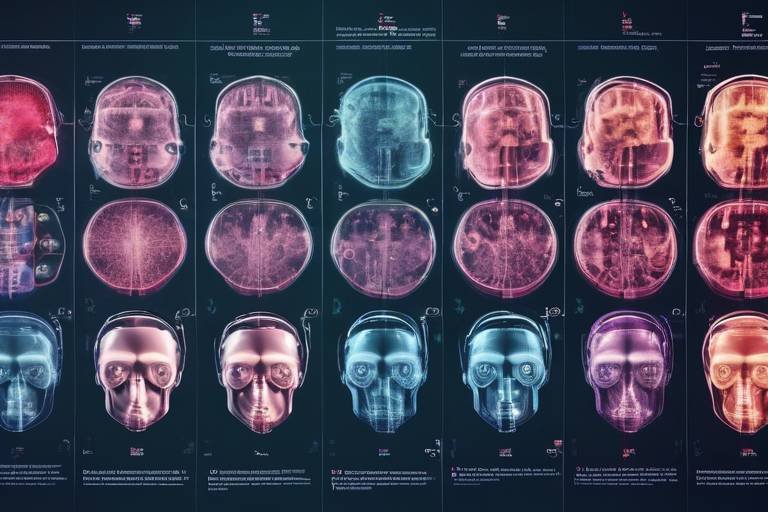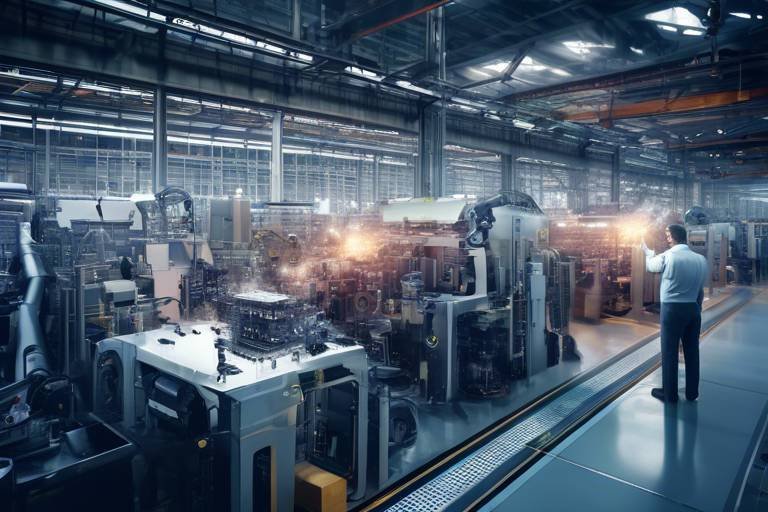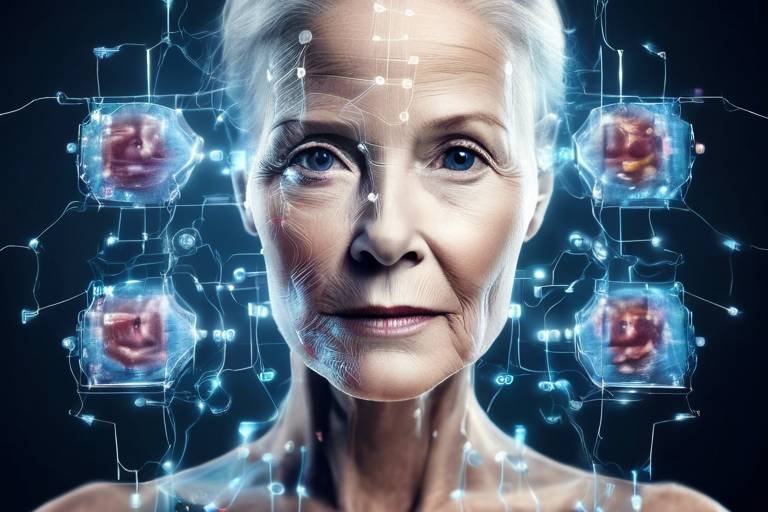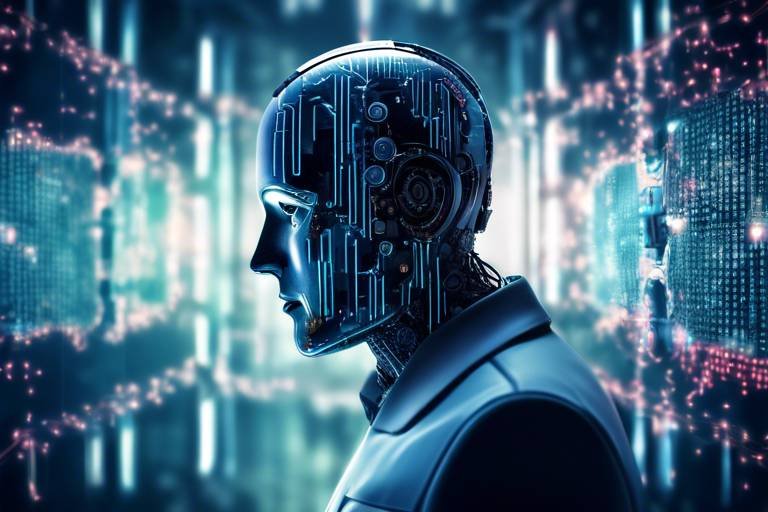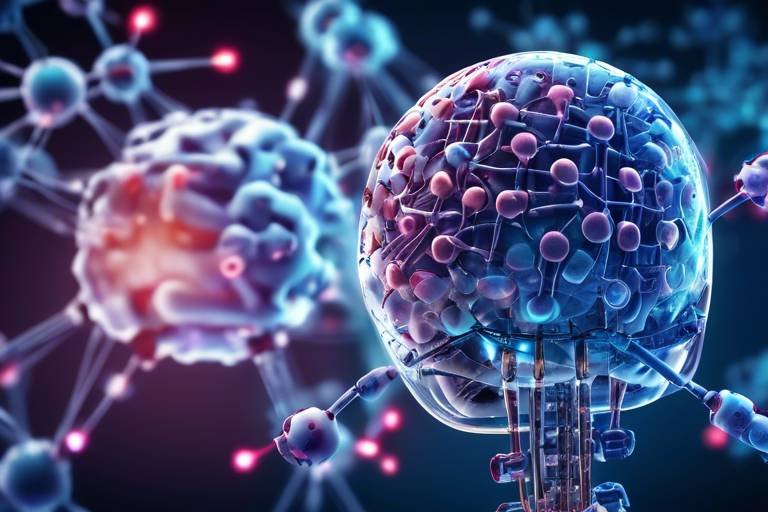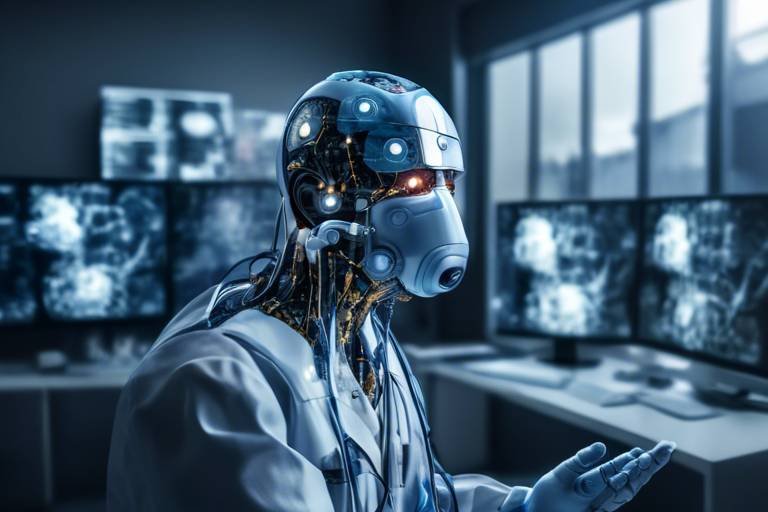The Evolution of AI in Medicine
The world of medicine is undergoing a revolution thanks to the advent of artificial intelligence (AI). This technological marvel is not just a trend; it's a seismic shift that promises to change how healthcare is delivered, experienced, and understood. Imagine a future where doctors are equipped with advanced tools that can predict patient outcomes with incredible accuracy, or where treatments are personalized down to the genetic level. This isn't science fiction; it's the reality being shaped by AI today. As we explore the transformative impact of AI on the medical field, we will highlight the advancements, challenges, and future prospects that define its evolution in healthcare.
To truly appreciate the impact of AI in medicine, we must first take a step back and examine its origins. The concept of using machines to assist in medical practices dates back several decades. In the early days, AI was primarily focused on simple tasks such as data management and patient record keeping. However, significant milestones have paved the way for today's sophisticated applications. For instance, in the 1970s, the development of expert systems like MYCIN, which diagnosed bacterial infections, marked a pivotal moment in AI's integration into healthcare. Fast forward to the 21st century, and we see AI technologies such as deep learning, natural language processing, and robotics making their way into various aspects of medical practice.
Today, AI is being utilized in a multitude of ways that enhance healthcare delivery and patient outcomes. From diagnostics to treatment planning and patient management, AI technologies are reshaping traditional practices. For example, AI algorithms can analyze vast amounts of data in seconds, identifying patterns that might take human doctors years to uncover. One notable application is in diagnostic imaging, where AI systems assist radiologists in interpreting medical images more accurately and efficiently. This not only speeds up the diagnostic process but also reduces the risk of human error.
When it comes to diagnostic imaging, AI is a game-changer. Algorithms designed for interpreting medical images are improving accuracy and reducing the time required for diagnosis. Imagine a world where a radiologist can quickly identify tumors or fractures with the help of AI, leading to faster treatment decisions. These algorithms are trained on thousands of images, learning to recognize anomalies that may be imperceptible to the human eye. The result? A significant boost in diagnostic confidence and patient safety.
At the heart of AI diagnostic tools are machine learning algorithms. These sophisticated systems are trained using vast datasets, enabling them to learn and improve over time. The training process involves feeding the algorithm thousands of labeled images, allowing it to understand what constitutes a healthy image versus one with abnormalities. As more data is analyzed, these algorithms become increasingly adept at making accurate predictions, ultimately leading to better patient outcomes.
Several case studies highlight the successful implementation of AI in radiology. For instance, a recent study demonstrated that an AI system could detect breast cancer in mammograms with a higher accuracy rate than human radiologists. This not only improved early detection rates but also reduced the workload for healthcare professionals. Such advancements illustrate the profound impact AI can have on patient outcomes and workflow efficiency.
Personalized medicine is another area where AI shines. By analyzing genetic data, AI technologies can tailor treatments to individual patient needs. This means that instead of a one-size-fits-all approach, healthcare providers can offer treatments that are specifically designed for the unique genetic makeup of each patient. This level of customization can lead to more effective treatments and fewer side effects, transforming the patient experience.
Despite the remarkable advancements, the integration of AI in medicine is not without its challenges. Ethical concerns, data privacy issues, and the need for robust regulatory frameworks are critical considerations that must be addressed. As we harness the power of AI, it is imperative to ensure that these technologies are used responsibly and equitably.
Data privacy is paramount in healthcare AI applications. With sensitive patient information at stake, the potential risks of data breaches are significant. Strategies for safeguarding patient information include implementing robust encryption methods and adhering to strict data governance policies. Ensuring that patient data is handled securely is essential for maintaining trust in AI technologies.
Another pressing issue is the bias present in AI algorithms. If the data used to train these systems is biased, it can lead to inequitable healthcare outcomes. For example, if an AI system is trained predominantly on data from one demographic group, it may not perform as well for others. Developing fair AI systems that consider diverse populations is crucial for ensuring equitable healthcare delivery.
Looking ahead, the future of AI in medicine is bright and full of potential. Emerging technologies, such as quantum computing and advanced robotics, may further revolutionize patient care and medical research. As we continue to innovate and explore the possibilities, the integration of AI in healthcare will undoubtedly lead to improved patient outcomes and a more efficient healthcare system.
- What is AI in medicine? - AI in medicine refers to the use of artificial intelligence technologies to assist in diagnosing, treating, and managing patient care.
- How does AI improve diagnostics? - AI enhances diagnostics by analyzing medical images and data quickly and accurately, identifying patterns that human doctors may miss.
- What are the ethical concerns surrounding AI in healthcare? - Ethical concerns include data privacy issues, algorithmic bias, and the need for regulations to ensure responsible AI usage.
- What is personalized medicine? - Personalized medicine tailors treatments to individual patients based on their genetic makeup and specific health needs, often aided by AI analysis.

Historical Overview of AI in Medicine
The journey of artificial intelligence (AI) in medicine is nothing short of fascinating. It’s like watching a young child grow into a remarkable adult, filled with potential and promise. The seeds of AI in healthcare were sown back in the 1950s, a time when computers were bulky and the concept of machines mimicking human intelligence was still in its infancy. Early pioneers like Alan Turing and John McCarthy laid the groundwork, envisioning a future where machines could assist in complex decision-making.
As we moved into the 1960s and 1970s, the first AI programs began to emerge, primarily focusing on diagnostic support. One of the notable milestones was the development of the DENDRAL program, which helped chemists analyze molecular structures. Similarly, the MYCIN system was created to assist in diagnosing bacterial infections and recommending antibiotics. These early systems, though limited, marked the dawn of AI's integration into medical practices, showcasing the potential for machines to enhance human capabilities.
Fast forward to the 1980s and 1990s, AI in medicine started gaining traction with the advent of expert systems. These systems were designed to emulate the decision-making abilities of human experts. They provided a structured approach to medical diagnosis and treatment, making healthcare more efficient. However, the technology was still hampered by limitations in computing power and data availability, hindering widespread adoption.
In the early 2000s, the landscape began to shift dramatically with the emergence of machine learning and increased access to vast amounts of data. The introduction of electronic health records (EHRs) provided a treasure trove of information that AI systems could analyze. This period marked a significant turning point, as algorithms became more sophisticated, allowing for better predictions and insights into patient care.
Today, AI continues to evolve, driven by advancements in deep learning and neural networks. These technologies enable machines to learn from data in ways that mimic human thought patterns, resulting in improved diagnostic tools and treatment plans. A pivotal moment in recent history was the development of AI systems capable of interpreting medical images with a level of accuracy that rivals human radiologists, significantly reducing the time required for diagnosis.
To summarize the historical milestones in AI's evolution within medicine, consider the following table:
| Year | Milestone | Description |
|---|---|---|
| 1950s | Pioneering Concepts | Foundational theories by Turing and McCarthy. |
| 1960s | DENDRAL | First AI program for chemical analysis. |
| 1970s | MYCIN | AI system for diagnosing infections. |
| 1980s-1990s | Expert Systems | Emulated human decision-making in healthcare. |
| 2000s | Machine Learning | Utilization of EHRs for data analysis. |
| 2010s-Present | Deep Learning | Advanced imaging analysis and predictive analytics. |
As we reflect on this historical overview, it’s clear that AI has come a long way from its humble beginnings. The integration of AI into medicine is not just a trend; it’s a revolution that holds the potential to redefine healthcare as we know it. The road ahead is filled with possibilities, and as technology continues to advance, we can only imagine the breakthroughs that lie on the horizon.

Current Applications of AI in Healthcare
The integration of artificial intelligence (AI) into healthcare is not just a trend; it's a revolutionary shift that is reshaping how medical professionals diagnose, treat, and manage patient care. With the power of AI, healthcare providers can leverage vast amounts of data to make informed decisions, streamline operations, and ultimately improve patient outcomes. Let's dive into the various ways AI is currently being utilized in the healthcare sector.
One of the most significant applications of AI is in diagnostics. AI algorithms can analyze medical data, including lab results and imaging studies, to help physicians make quicker and more accurate diagnoses. For instance, AI-driven tools can interpret X-rays, MRIs, and CT scans with remarkable precision. This not only enhances the accuracy of diagnoses but also reduces the time it takes to identify conditions, which is crucial in emergencies.
In the realm of diagnostic imaging, AI technologies are proving to be game-changers. By employing machine learning algorithms, these systems can learn from vast datasets of medical images, identifying patterns that may be missed by the human eye. This capability is particularly useful in fields like radiology, where the volume of images can be overwhelming. For example, algorithms can detect early signs of diseases such as cancer, often leading to earlier interventions and better patient prognoses.
Machine learning algorithms are at the heart of AI diagnostic tools. These algorithms undergo a rigorous training process, where they are exposed to thousands, if not millions, of images to learn the subtle differences between healthy and diseased tissues. Over time, as they analyze more data, these algorithms improve, becoming more adept at identifying anomalies with each iteration. This continuous learning process not only enhances diagnostic accuracy but also builds confidence among healthcare providers in using AI as a supportive tool in their practice.
To illustrate the impact of AI in radiology, consider the case of a major hospital that implemented an AI system to assist radiologists in detecting lung cancer. The AI model was trained on a dataset comprising thousands of chest X-rays. Following its implementation, the hospital reported a significant reduction in missed diagnoses, with the AI tool flagging potential issues that radiologists could review. This not only improved patient care but also optimized radiology workflows, allowing specialists to focus on complex cases rather than routine screenings.
Another exciting application of AI is in personalized medicine. AI technologies can analyze genetic data, patient history, and lifestyle factors to tailor treatments specifically for individual patients. This means that instead of a one-size-fits-all approach, healthcare providers can create treatment plans that consider the unique genetic makeup and health profiles of their patients. Imagine the difference it makes when a treatment is designed specifically for you rather than a generic formula!
Furthermore, AI is being used in patient management systems. These systems can predict patient needs, schedule appointments, and even remind patients to take their medications. By utilizing AI, healthcare facilities can enhance patient engagement and satisfaction while reducing administrative burdens on staff. For instance, AI chatbots can answer common patient inquiries, freeing up time for healthcare professionals to focus on more complex tasks.
In summary, the current applications of AI in healthcare are vast and varied, encompassing diagnostics, personalized medicine, and patient management. As AI continues to evolve, its potential to transform healthcare is only just beginning to be realized.
- What is the role of AI in diagnostics? AI helps in analyzing medical data to provide quicker and more accurate diagnoses.
- How does AI improve personalized medicine? AI analyzes genetic and lifestyle data to tailor treatments to individual patient needs.
- Are there any challenges associated with AI in healthcare? Yes, challenges include data privacy, algorithm bias, and the need for regulatory frameworks.

AI in Diagnostic Imaging
When we think about the future of healthcare, one of the most exciting areas is diagnostic imaging. Imagine a world where machines can analyze medical images faster and more accurately than any human could. That's not just a dream—it's happening right now, thanks to artificial intelligence (AI). AI technologies are revolutionizing how we view and interpret images like X-rays, MRIs, and CT scans. They are not only enhancing the accuracy of diagnoses but also significantly reducing the time it takes to get results. This is crucial in emergency situations where every second counts.
One of the key advancements in AI for diagnostic imaging is the development of sophisticated algorithms. These algorithms can be trained to recognize patterns in images, identifying abnormalities that might be missed by the human eye. For instance, AI can detect early signs of diseases such as cancer, which can be pivotal in improving patient outcomes. The algorithms analyze thousands of images, learning from each one to improve their accuracy over time. This process is akin to teaching a child to recognize different objects; the more examples they see, the better they become at identifying them.
Moreover, AI's ability to process vast amounts of data is transforming the workflow in radiology departments. Traditionally, radiologists would spend hours sifting through images to find potential issues. Now, AI can assist by flagging images that require immediate attention. This not only speeds up the diagnostic process but also allows radiologists to focus on more complex cases that require human expertise. The integration of AI in diagnostic imaging is a game-changer, ensuring that patients receive timely and accurate diagnoses.
At the heart of AI in diagnostic imaging are machine learning algorithms. These algorithms are designed to learn from data, meaning they can improve their performance as they are exposed to more examples. For instance, a machine learning model trained on thousands of chest X-rays can learn to differentiate between healthy and unhealthy lungs. Over time, these algorithms become more adept at recognizing subtle differences that indicate various medical conditions. The training process involves feeding the algorithm large datasets and adjusting its parameters until it can accurately predict outcomes based on the images it analyzes.
To understand the real-world impact of AI in diagnostic imaging, let's look at some notable case studies. In one instance, an AI system was implemented in a hospital's radiology department, where it was tasked with analyzing mammograms. The results were astounding: the AI was able to detect breast cancer with an accuracy rate that surpassed that of experienced radiologists. In another case, a study revealed that AI could reduce the time taken to interpret CT scans for stroke patients by up to 30%. These examples demonstrate how AI not only enhances diagnostic accuracy but also streamlines workflows, ultimately leading to better patient care.
As we continue to explore the capabilities of AI in diagnostic imaging, it's clear that the technology is not here to replace radiologists but to empower them. By reducing the burden of routine tasks, AI allows healthcare professionals to dedicate their time and expertise to more critical aspects of patient care. The future of diagnostic imaging looks bright, and with ongoing advancements in AI, we can expect even more remarkable improvements in the years to come.
- What is AI in diagnostic imaging? AI in diagnostic imaging refers to the use of artificial intelligence technologies to analyze medical images, improving accuracy and efficiency in diagnoses.
- How does AI improve diagnostic accuracy? AI algorithms are trained on large datasets of medical images, allowing them to recognize patterns and abnormalities that may be missed by human radiologists.
- Can AI replace radiologists? No, AI is designed to assist radiologists, not replace them. It helps reduce their workload and allows them to focus on more complex cases.
- What are the benefits of using AI in healthcare? AI offers faster diagnoses, improved accuracy, and enhanced workflow efficiency, ultimately leading to better patient outcomes.

Machine Learning Algorithms
Machine learning algorithms are the beating heart of artificial intelligence in medicine, acting as the sophisticated engines that drive diagnostic tools and predictive models. These algorithms are designed to learn from data, improving their accuracy and efficiency over time. Imagine training a dog; the more you teach it, the better it becomes at following commands. Similarly, machine learning algorithms refine their performance as they are exposed to more medical data, enabling them to make increasingly accurate predictions and decisions.
At the core of these algorithms are various types, each with its unique approach to processing information. Some of the most common types include:
- Supervised Learning: This method involves training the algorithm on a labeled dataset, where the outcomes are known. It’s akin to having a teacher guiding a student through problems until they can solve them independently.
- Unsupervised Learning: In contrast, this type doesn’t use labeled data. Instead, it identifies patterns and relationships in the data on its own, much like a detective piecing together clues from a crime scene.
- Reinforcement Learning: This approach is all about learning through trial and error. The algorithm receives feedback based on its actions, allowing it to adjust and improve over time, similar to how a child learns to ride a bike by falling and getting back up.
One of the remarkable aspects of machine learning algorithms is their ability to process vast amounts of data quickly. For example, in diagnostic imaging, algorithms can analyze thousands of images in a fraction of the time it would take a human radiologist. This speed not only enhances productivity but also helps in reducing the backlog of cases in hospitals, ensuring that patients receive timely care.
Moreover, these algorithms are continuously evolving. As they are fed with new data, they adapt and become more proficient. This characteristic is crucial in the medical field, where new diseases and treatment protocols emerge regularly. For instance, during the COVID-19 pandemic, machine learning algorithms were rapidly updated to analyze new variants of the virus, aiding in vaccine development and public health responses.
However, the effectiveness of machine learning algorithms heavily relies on the quality of the data they are trained on. If the data is biased or incomplete, the algorithms may produce skewed results, leading to misdiagnoses or inappropriate treatment plans. Therefore, ensuring that the datasets used are diverse and representative is paramount for the reliability of these AI systems.
In summary, machine learning algorithms are revolutionizing the medical landscape by enhancing diagnostic accuracy, expediting processes, and enabling personalized treatment plans. As these technologies continue to mature, the potential for improved patient outcomes becomes increasingly promising, paving the way for a future where AI and healthcare work hand in hand.
- What are machine learning algorithms? Machine learning algorithms are computational methods that allow systems to learn from data and improve over time without being explicitly programmed.
- How do machine learning algorithms improve in healthcare? They improve by analyzing large sets of medical data, learning patterns, and making predictions that enhance diagnostic and treatment processes.
- What types of machine learning algorithms are used in medicine? Common types include supervised learning, unsupervised learning, and reinforcement learning, each serving different purposes and applications.
- What challenges do machine learning algorithms face in healthcare? Challenges include data quality, bias in training datasets, and the need for robust regulatory frameworks to ensure safe and effective use.

Case Studies in Radiology
In the realm of radiology, the integration of artificial intelligence (AI) has not only enhanced diagnostic capabilities but has also redefined the workflow within medical imaging departments. One of the most compelling case studies is the implementation of AI algorithms in detecting lung cancer through chest X-rays. A pioneering study conducted by researchers at Stanford University demonstrated that an AI system could identify malignancies with an accuracy that rivaled that of experienced radiologists. This breakthrough is monumental, as it highlights the potential of AI to assist in early detection, ultimately leading to better patient outcomes.
Another notable case study comes from the use of AI in mammography. In a trial involving thousands of mammogram images, an AI model developed by Google Health was able to reduce false positives by 5.7% and false negatives by 9.4%. This means that not only were fewer women subjected to unnecessary biopsies, but also more cases of breast cancer were detected earlier than they might have been without AI intervention. This showcases the profound impact AI can have on improving diagnostic accuracy and patient care.
Moreover, AI's role in enhancing the efficiency of radiology departments cannot be overstated. A recent project at a leading hospital involved the integration of AI software to prioritize imaging studies based on urgency. The AI system analyzed patient history and clinical data, allowing radiologists to focus on the most critical cases first. This not only improved workflow but also significantly reduced the turnaround time for urgent diagnoses, which is crucial in emergency situations.
To better illustrate these advancements, the following table summarizes key case studies highlighting the impact of AI in radiology:
| Case Study | AI Application | Outcome |
|---|---|---|
| Stanford Lung Cancer Detection | Chest X-ray analysis | Accuracy comparable to radiologists |
| Google Health Mammography Study | Mammogram analysis | Reduced false positives/negatives |
| Hospital AI Workflow Integration | Urgency prioritization | Improved efficiency and reduced turnaround time |
These case studies illustrate just a fraction of the transformative effects AI can have in the field of radiology. As technology continues to evolve, the collaboration between human expertise and AI capabilities promises to enhance diagnostic accuracy, streamline workflows, and ultimately improve patient care across the board.
Q: How does AI improve diagnostic accuracy in radiology?
A: AI algorithms analyze vast amounts of imaging data, learning from patterns and anomalies that may not be easily recognizable by human eyes, thus enhancing diagnostic precision.
Q: Are there any risks associated with AI in radiology?
A: Yes, potential risks include data privacy concerns and the possibility of biased algorithms leading to unequal healthcare outcomes. It's crucial to implement robust regulatory frameworks to mitigate these risks.
Q: What is the future of AI in radiology?
A: The future looks promising, with advancements in machine learning and data analytics expected to further refine diagnostic processes, personalize patient care, and improve overall healthcare delivery.

AI in Personalized Medicine
In the realm of healthcare, personalized medicine is like a tailored suit—crafted specifically for the individual, ensuring a perfect fit. This approach leverages the power of artificial intelligence to analyze vast amounts of data, including genetic, environmental, and lifestyle factors, to create customized treatment plans that cater to each patient's unique profile. Imagine a world where your doctor's prescription is not just a one-size-fits-all solution but a carefully curated plan designed just for you. This is the promise of AI in personalized medicine.
At the heart of this transformation is the ability of AI to process and interpret complex datasets at lightning speed. For instance, AI algorithms can analyze genetic sequences to identify mutations that may affect how a patient responds to certain medications. By understanding these nuances, healthcare providers can prescribe treatments that are not only more effective but also minimize the risk of adverse reactions. This is particularly crucial in fields like oncology, where cancer treatments can vary significantly based on an individual's genetic makeup.
Moreover, the integration of AI into personalized medicine has led to significant advancements in drug discovery. Traditional methods of developing new medications can take years, if not decades, and often result in high failure rates. However, AI can streamline this process by predicting how different compounds will interact with various biological targets. This capability not only accelerates the development of new therapies but also reduces costs, making cutting-edge treatments more accessible to patients.
One striking example of AI's role in personalized medicine is seen in the treatment of diabetes. AI-powered platforms can analyze data from continuous glucose monitors and other health apps to provide real-time insights into a patient's condition. By utilizing this data, healthcare providers can offer personalized recommendations on diet, exercise, and medication adjustments, ultimately leading to better management of the disease.
Furthermore, the future of personalized medicine is bright, with ongoing research exploring the potential of AI in predicting disease risk and progression. For instance, by analyzing a combination of genetic data and lifestyle factors, AI can help identify individuals at higher risk for conditions like heart disease or diabetes, allowing for early intervention and preventive care strategies. This proactive approach not only enhances patient outcomes but also reduces the overall burden on healthcare systems.
However, as we embrace the capabilities of AI in personalized medicine, it is essential to remain vigilant about the challenges it presents. Issues such as data privacy, algorithmic bias, and ethical considerations must be addressed to ensure that these advanced technologies benefit all patients equitably. The journey towards truly personalized medicine is ongoing, but with AI leading the way, the horizon looks promising.
- What is personalized medicine?
Personalized medicine is an approach to healthcare that tailors treatment plans to individual patients based on their unique genetic, environmental, and lifestyle factors. - How does AI contribute to personalized medicine?
AI analyzes complex datasets to identify patterns and insights that help healthcare providers create customized treatment plans, improving patient outcomes. - What are some examples of AI in personalized medicine?
AI is used in drug discovery, treatment planning for conditions like cancer and diabetes, and predicting disease risk based on genetic data. - Are there any challenges associated with AI in personalized medicine?
Yes, challenges include data privacy concerns, algorithmic bias, and the need for ethical guidelines to ensure equitable access to AI-driven healthcare solutions.

Challenges and Ethical Considerations
As we embrace the remarkable advancements in artificial intelligence (AI) within the medical field, it's crucial to address the that accompany this technological evolution. While AI offers unprecedented opportunities for improving patient care and streamlining healthcare processes, it also raises significant concerns that cannot be overlooked. One of the foremost issues is data privacy. In an age where patient information is increasingly digitized, the risk of data breaches looms large. Healthcare organizations must ensure that robust security measures are in place to protect sensitive patient data from unauthorized access. This is not just about compliance with regulations like HIPAA; it's about maintaining the trust that patients place in their healthcare providers.
Moreover, the integration of AI in medicine brings forth the challenge of bias and fairness in algorithms. AI systems learn from historical data, and if that data reflects existing biases—be it racial, gender-based, or socioeconomic—those biases can be perpetuated in AI decision-making. For instance, if an AI tool is trained predominantly on data from one demographic group, it may not perform well for patients outside that group, leading to inequitable healthcare outcomes. This raises a pressing question: how do we ensure that AI technologies are developed and trained in ways that are fair and inclusive? The answer lies in diversifying the datasets used for training and continuously monitoring AI systems for biased outcomes.
Another ethical concern revolves around the autonomy of healthcare professionals. With AI taking on more diagnostic and decision-making roles, there's a fear that human oversight may diminish. While AI can provide valuable insights and recommendations, the ultimate responsibility for patient care should always rest with qualified healthcare professionals. This leads to a critical discussion about the balance between leveraging AI's capabilities and ensuring that human judgment remains central in the medical decision-making process.
To navigate these challenges, it is essential for the healthcare industry to establish comprehensive regulatory frameworks that govern the use of AI technologies. These frameworks should not only address data privacy and security but also promote ethical AI development practices. By fostering collaboration among technologists, healthcare providers, and policymakers, we can create a landscape where AI enhances patient care without compromising ethical standards.
In conclusion, while the potential of AI in medicine is vast, we must tread carefully. Addressing challenges related to data privacy, algorithmic bias, and the autonomy of healthcare professionals is crucial for the responsible integration of AI in healthcare. By prioritizing ethical considerations, we can ensure that AI serves as a tool for good, ultimately improving patient outcomes and maintaining the trust that is foundational to the healthcare system.
- What are the main ethical concerns surrounding AI in medicine?
The primary concerns include data privacy, algorithmic bias, and the autonomy of healthcare professionals. - How can we ensure data privacy in AI healthcare applications?
Implementing robust security measures and complying with regulations like HIPAA are essential for protecting patient data. - What is the impact of biased AI algorithms on patient care?
Biased algorithms can lead to inequitable healthcare outcomes, affecting the quality of care for underrepresented groups. - Why is human oversight important in AI decision-making?
Human judgment is crucial for interpreting AI recommendations and ensuring patient care remains personalized and compassionate.

Data Privacy and Security
In the era of digital transformation, where artificial intelligence (AI) is becoming an integral part of healthcare, have emerged as critical concerns. As healthcare organizations increasingly rely on AI to enhance patient care, the amount of sensitive data being collected, analyzed, and stored has skyrocketed. This raises the question: how do we protect this invaluable information while reaping the benefits of AI?
Firstly, it's essential to understand that patient data is not just a collection of numbers and letters; it encompasses personal histories, genetic information, and even lifestyle choices. Therefore, the implications of data breaches are profound. A compromised database can lead to identity theft, insurance fraud, and a significant erosion of trust between patients and healthcare providers. The stakes are high, and the healthcare industry must navigate these challenges with utmost diligence.
To tackle these challenges, healthcare organizations must implement robust security measures. These can include:
- Encryption: Transforming data into a secure format that can only be read by authorized users.
- Access Controls: Limiting data access to only those individuals who need it for their job functions.
- Regular Audits: Conducting frequent assessments of data security practices to identify vulnerabilities.
Moreover, compliance with regulations such as the Health Insurance Portability and Accountability Act (HIPAA) is non-negotiable. HIPAA sets the standard for protecting sensitive patient information, and any violations can result in hefty fines and legal repercussions. Organizations must not only comply with existing laws but also stay updated on emerging regulations that govern AI in healthcare.
Additionally, the ethical implications of data usage cannot be overlooked. AI systems often rely on vast datasets to learn and improve, but if these datasets include biased or incomplete information, the resulting algorithms can perpetuate inequities in healthcare. This is why it’s crucial to establish ethical guidelines that prioritize patient consent and transparency in how data is used and shared.
In conclusion, while AI holds the promise of revolutionizing healthcare, the responsibility of protecting patient data falls squarely on the shoulders of healthcare providers and technology developers. By prioritizing , the industry can foster trust and ensure that the benefits of AI are realized without compromising patient safety.
- What are the main risks associated with AI in healthcare? The primary risks include data breaches, biased algorithms, and potential misuse of patient information.
- How can healthcare providers ensure data security? They can implement encryption, access controls, and conduct regular security audits to safeguard patient data.
- What regulations govern data privacy in healthcare? The Health Insurance Portability and Accountability Act (HIPAA) is the primary regulation, but there are also emerging laws that address AI-specific concerns.

Bias and Fairness in AI Algorithms
As we journey deeper into the realm of artificial intelligence (AI) in medicine, one critical issue looms large: . This concern isn't just a technical glitch; it’s a fundamental challenge that can significantly impact healthcare outcomes. Imagine a world where a patient's treatment is determined not by their unique medical needs but by the biases embedded in the algorithms that guide healthcare decisions. That’s a scary thought, isn’t it?
Bias in AI can arise from various sources, and it is crucial to recognize these pitfalls to ensure that AI systems are fair and equitable. The data used to train these algorithms often reflects historical inequalities, which can lead to biased outcomes. For instance, if an AI system is trained predominantly on data from one demographic group, it may not perform well for individuals from other groups. This can perpetuate existing disparities in healthcare access and outcomes. Here are some common sources of bias:
- Data Bias: When training datasets do not represent the diversity of the population, leading to skewed results.
- Algorithmic Bias: When the algorithms themselves are designed in a way that favors certain outcomes or groups.
- Human Bias: The biases of the developers and researchers can inadvertently influence the design and implementation of AI systems.
To combat these biases, it’s essential to implement strategies that promote fairness in AI algorithms. This includes diversifying the datasets used for training, regularly auditing algorithms for biased outcomes, and involving a diverse group of stakeholders in the development process. By doing so, we can work towards creating AI systems that not only enhance efficiency but also uphold the principles of equity and justice in healthcare.
Moreover, the implications of biased AI algorithms extend beyond individual patients; they can affect entire populations. For instance, if a predictive algorithm used in hospitals disproportionately underestimates the risk for certain ethnic groups, it could lead to inadequate care for those populations. This scenario highlights the urgent need for regulatory frameworks that ensure AI systems are developed and deployed responsibly. It’s not just about what AI can do; it’s about what it should do to promote fairness and equity.
In summary, addressing bias and fairness in AI algorithms is not merely an ethical obligation; it is a necessity for the future of healthcare. As we continue to integrate AI into medical practices, we must be vigilant in recognizing and mitigating biases to ensure that all patients receive the care they deserve. The journey towards fairness in AI is ongoing, and it requires collaboration between technologists, healthcare professionals, and policymakers to create a system that truly serves everyone.
- What is bias in AI algorithms? Bias in AI algorithms refers to systematic errors that lead to unfair treatment of certain groups or individuals, often resulting from biased training data.
- How can we mitigate bias in AI? Mitigating bias can be achieved through diverse datasets, regular audits, and inclusive development practices.
- Why is fairness important in healthcare AI? Fairness is crucial to ensure that all patients receive equitable treatment and care, preventing disparities in health outcomes.

The Future of AI in Medicine
The future of artificial intelligence (AI) in medicine is not just a vision; it's an unfolding reality that promises to reshape healthcare as we know it. Imagine a world where diagnoses are faster, treatments are more personalized, and patient outcomes are significantly improved. The integration of AI technologies is paving the way for this future, and the possibilities are both exciting and profound.
As we look ahead, several trends are emerging that will likely define the next phase of AI in medicine. One of the most significant advancements is the development of predictive analytics. By harnessing vast amounts of patient data, AI can identify patterns that humans might overlook. This capability enables healthcare providers to predict disease outbreaks, anticipate patient needs, and even personalize treatment plans based on predictive models. For instance, AI-driven tools can analyze a patient's medical history, lifestyle, and genetic information to foresee potential health issues before they arise.
Another area where AI is set to make a tremendous impact is in robot-assisted surgeries. These advanced robotic systems, powered by AI, can enhance precision in surgical procedures, reduce recovery times, and minimize the risk of complications. Imagine a surgeon working alongside a robotic assistant that can provide real-time data and analytics during an operation, ensuring that every decision is informed by the latest information. This synergy could lead to a new era of minimally invasive surgeries, drastically improving patient experiences.
Moreover, the integration of AI with telemedicine is revolutionizing how healthcare is delivered. With the rise of remote consultations, AI can assist in triaging patients, analyzing symptoms, and even suggesting preliminary diagnoses. This not only enhances accessibility to healthcare, especially in underserved areas, but also allows healthcare professionals to focus on complex cases that require human intervention. The combination of AI and telehealth could very well lead to a more efficient healthcare system, where patients receive timely care without the barriers of distance.
However, as we embrace these advancements, we must also consider the implications of AI in medicine. The ethical dimensions cannot be overlooked. Questions surrounding data privacy and the potential for biased algorithms must be addressed to ensure that the benefits of AI are equitably distributed. The healthcare community will need to establish robust regulatory frameworks that not only foster innovation but also protect patient rights and ensure fair access to AI-driven solutions.
In conclusion, the future of AI in medicine holds tremendous promise. As we stand on the brink of this technological revolution, it is crucial to maintain a balance between innovation and ethical responsibility. By doing so, we can harness the full potential of AI to create a healthcare system that is not only more efficient but also more humane. The journey ahead may be complex, but the destination is one that could lead to healthier lives and a brighter future for patients around the world.
- What are the potential benefits of AI in medicine? AI can enhance diagnostic accuracy, personalize treatments, and improve patient outcomes through predictive analytics and robotic assistance.
- How does AI impact patient privacy? AI applications must adhere to strict data privacy regulations to protect sensitive patient information and ensure ethical use of data.
- Will AI replace healthcare professionals? While AI can assist in many tasks, it is designed to complement healthcare professionals, not replace them, allowing them to focus on more complex patient needs.
- What challenges does AI face in the medical field? Challenges include addressing biases in algorithms, ensuring data security, and navigating the ethical implications of AI technologies.
Frequently Asked Questions
- What is the role of AI in diagnostics within healthcare?
AI plays a crucial role in diagnostics by enhancing the accuracy and speed of interpreting medical images. For instance, AI algorithms can analyze X-rays, MRIs, and CT scans, identifying anomalies that may be missed by the human eye. This not only improves patient outcomes but also streamlines the workflow for healthcare professionals.
- How does AI contribute to personalized medicine?
AI contributes to personalized medicine by analyzing vast amounts of genetic and clinical data to tailor treatments to individual patients. By understanding a patient's unique genetic makeup, AI can help healthcare providers develop customized treatment plans that are more effective and have fewer side effects compared to traditional one-size-fits-all approaches.
- What are the ethical concerns associated with AI in medicine?
Ethical concerns regarding AI in medicine include data privacy, algorithmic bias, and the need for transparency in AI decision-making. Ensuring that patient data is protected and that AI systems do not perpetuate existing biases are critical challenges that the medical community must address as AI technology continues to evolve.
- Can AI algorithms be biased, and how does it affect healthcare?
Yes, AI algorithms can be biased if they are trained on datasets that do not represent the diversity of the population. This can lead to inequitable healthcare outcomes, where certain groups may receive less accurate diagnoses or treatment recommendations. Addressing bias in AI is essential for ensuring fair and effective healthcare for all patients.
- What are some future trends we can expect from AI in medicine?
Future trends in AI within medicine include advancements in predictive analytics, more sophisticated machine learning models, and greater integration of AI tools in everyday clinical practice. As technology continues to advance, we can expect AI to play an even more significant role in enhancing patient care and improving healthcare outcomes.

